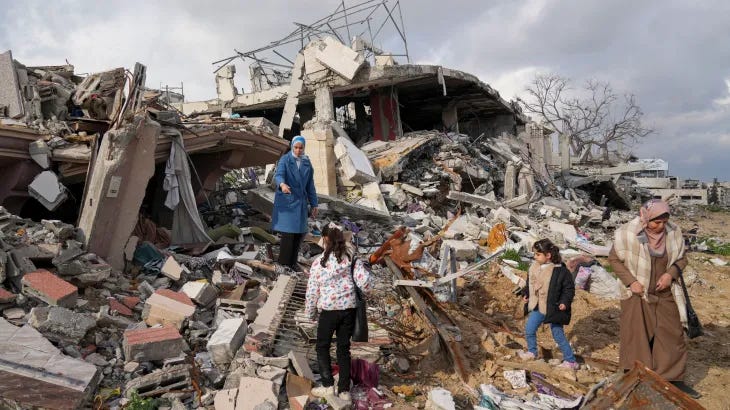Israel’s Refusal to Withdraw From Gaza’s Philadelphi Corridor Caused Ceasefire Collapse
Israel’s decision to maintain military presence in the strategic border area disrupts peace efforts, resulting in continued violence and humanitarian concerns.

PALESTINE — The recent ceasefire between Israel and Hamas that was agreed to on January 19 has collapsed due to disputes over key provisions, particularly Israel’s refusal to withdraw troops from Gaza’s Philadelphi Corridor and engage in phase two negotiations.
The ceasefire aimed to halt the Israel Defense Forces (IDF) 16-month bombardment of Gaza with a multi-phased approach to de-escalation.
Phase one included the exchange of Israeli and Palestinian hostages, increasing humanitarian aid to Gaza, and a partial withdrawal of Israeli forces. Specifically, Israel agreed to begin withdrawing from the Philadelphi Corridor — a strategic 14-kilometer strip along the Gaza-Egypt border — starting March 1, with complete withdrawal expected within eight days.
Contrary to the agreement, on February 27, Israeli officials announced that the IDF would not withdraw from the Philadelphi Corridor as stipulated. An Israeli official stated, “We will not leave the Philadelphi Corridor. We will not allow the Hamas murderers to again roam our borders with pickup trucks and guns, and we will not allow them to rearm through smuggling.”
This refusal impeded progress to phase two discussions, which were intended to address a complete Israeli withdrawal and a lasting cessation of hostilities.
Despite the ceasefire, the IDF continued its violence in Gaza. As of February 12, 2025, at least 118 Palestinians were killed in Gaza, including 92 indirect Israeli attacks, according to local health officials. The Gaza Government Media Office reported 265 ceasefire violations by Israel during this period.
By March 2, Israel announced the cessation of all humanitarian aid to the Gaza Strip, aiming to pressure Hamas into accepting a revised ceasefire proposal. In a post on X (formerly Twitter), Israeli Prime Minister Benjamin Netanyahu said, “In light of Hamas's rejection of the Witkoff framework, we decided – at last night's discussion – that as of this morning, the entry of goods and supplies into Gaza will be prevented.”
The United Nations humanitarian chief, Tom Fletcher, called the move “alarming” and said that aid access must continue in accordance with international law.
Oxfam criticized the move, saying, “Israel’s decision to block aid to over 2 million Palestinians in the Gaza Strip as Ramadan begins is a reckless act of collective punishment, explicitly prohibited under international humanitarian law. The government of Israel, as occupying power, has the responsibility to ensure that humanitarian aid can reach the population in Gaza.”
The Council on American-Islamic Relations (CAIR) responded by calling Netanyahu a “war criminal” and his decision to cut off aid “war crime.”
“The decision by the far-right government of indicted war criminal Benjamin Netanyahu to block all humanitarian aid to the civilian population of Gaza during Ramadan is a clear war crime and is further evidence of Israel's genocidal intent,” CAIR said in a post on X (Formerly Twitter).
Additionally, in the International Criminal Court (ICC) decision to issue arrest warrants for Netanyahu and former Israeli Defense Minister Yoav Gallant, the ICC said it was reasonable to believe that “each has committed the war crime of using starvation as a method of warfare and crimes against humanity of murder, persecution, and other inhumane acts, as a direct perpetrator, acting jointly with others.”
While Netanyahu said that Hamas rejected the Witkoff framework, Jeremy Scahill, a journalist at DropSite News, reported that Hamas officials weren't even aware of the framework's details when Israel publicly announced that they had rejected it.
“A senior Hamas official just told me that Israel publicly announced Hamas had rejected the so-called Witkoff proposal before Hamas had even been officially briefed on it by mediators and given its response,” Scahill posted on X (formerly Twitter). “He added that Hamas's position remains that Israel is in violation of the signed agreement and is demanding that mediators compel Israel to respect the terms of the deal.”
According to Scahill, negotiations for phase two of the ceasefire deal were supposed to start on Feb. 3, but Israel has refused to begin Phase two negotiations.
Israel also refused to release over 600 Palestinian hostages on Feb. 22, citing concerns over alleged Hamas misconduct during Israeli hostage releases — even though Hamas released all 33 Israeli hostages agreed upon during phase one.
Media coverage has often portrayed Hamas as the primary violator of the ceasefire. However, the sequence of events indicates that Israel’s actions, particularly the refusal to withdraw from the Philadelphi Corridor and delays in prisoner releases, contributed significantly to the ceasefire’s failure.
Since the violence erupted in the wake of Oct. 7, 2023, more than 48,000 Palestinians have been killed, according to the Gaza Health Ministry. Research from The Lancet has estimated the actual death toll to be as high as 186,000. The U.N. has verified that nearly 70% of all casualties were women or children.



